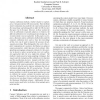Free Online Productivity Tools
i2Speak
i2Symbol
i2OCR
iTex2Img
iWeb2Print
iWeb2Shot
i2Type
iPdf2Split
iPdf2Merge
i2Bopomofo
i2Arabic
i2Style
i2Image
i2PDF
iLatex2Rtf
Sci2ools
146
click to vote
3DIM
2005
IEEE
2005
IEEE
Bayesian Modelling of Camera Calibration and Reconstruction
Camera calibration methods, whether implicit or explicit, are a critical part of most 3D vision systems. These methods involve estimation of a model for the camera that produced the visual input, and subsequently to infer the 3D structure that gave rise to the input. However, in these systems the error in calibration is typically unknown, or if known, the effect of calibration error on subsequent processing (e.g. 3d reconstruction) is not accounted for. In this paper, we propose a Bayesian camera calibration method that explicitly computes calibration error, and we show how knowledge of this error can be used to improve the accuracy of subsequent processing. What distinguishes the work is the explicit computation of a posterior distribution on unknown camera parameters, rather than just a best estimate. Marginalizing (averaging) subsequent estimates by this posterior is shown to reduce reconstruction error over calibration approaches that rely on a single best estimate. The method is ...
Related Content
| Added | 13 Oct 2010 |
| Updated | 13 Oct 2010 |
| Type | Conference |
| Year | 2005 |
| Where | 3DIM |
| Authors | Rashmi Sundareswara, Paul R. Schrater |
Comments (0)

